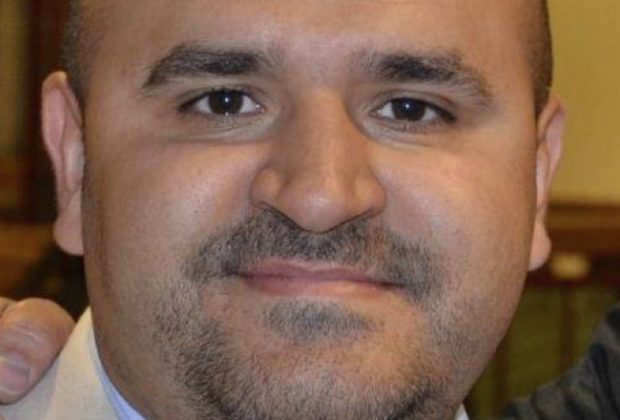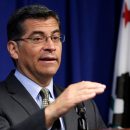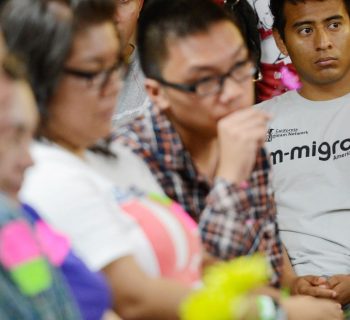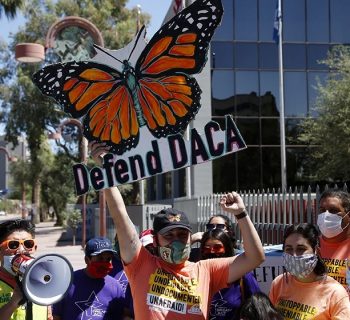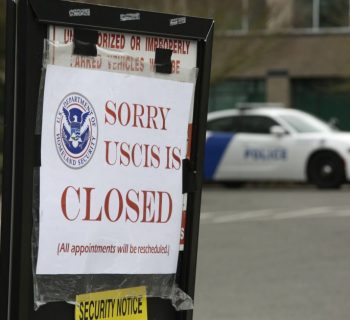By: Fernanda Zamudio-Suaréz, The Chronicle of Higher-Ed ~ Sept. 12, 2017
 Shortly after President Trump’s inauguration in January, Armando Bustamante, a student-programs specialist at the University of New Mexico’s El Centro de la Raza, a resource center for Latino students at the university, changed his email signature. It now reads, "Es mejor morir de pie que vivir de rodillas." A quote by Emiliano Zapata, a leader in the Mexican Revolution, it translates to: "It’s better to die on your feet than to live on your knees."
Shortly after President Trump’s inauguration in January, Armando Bustamante, a student-programs specialist at the University of New Mexico’s El Centro de la Raza, a resource center for Latino students at the university, changed his email signature. It now reads, "Es mejor morir de pie que vivir de rodillas." A quote by Emiliano Zapata, a leader in the Mexican Revolution, it translates to: "It’s better to die on your feet than to live on your knees."
Months before President Trump’s administration announced plans to end the Deferred Action for Childhood Arrivals program, an Obama-era policy that gives undocumented immigrants the opportunity to attend college and work with two-year permits, Mr. Bustamante knew that undocumented students at his institution could be in danger of having their DACA permits revoked.
After Jeff Sessions, the attorney general, announced last week that the program would be rescinded after a six-month delay to give Congress time to pass a legislative fix, Mr. Bustamante’s work at the center carried on. The only difference: Many more people in the community want to hear from Mr. Bustamante about his work at the center, he said.
As a week of turmoil ended for Mr. Bustamante, he was occupied by administrative tasks: setting up meetings and planning presentations. But there were also the emails and instant messages from students that sometimes kept him up until 1 a.m.
On Friday, three days after Mr. Sessions’s announcement, Mr. Bustamante’s day started at 7:30 a.m., when he opened El Centro’s offices. He responded to emails and coordinated a location change for the "Know Your Rights" workshop to inform the campus community and undocumented students about what to do if confronted by U.S. Immigration and Customs Enforcement. Though these workshops aren’t new to the campus, attendance has increased through the year. The original space could hold 80 people, but the new location accommodated more. That afternoon about 220 people showed up.
Mr. Bustamante hurried off the phone to see one of the undocumented students he meets with regularly. She’s having trouble paying for her last semester this coming spring. She’s also not enrolled this fall because she can’t pay tuition. For 45 minutes, she and Mr. Bustamante discussed her limited options. She’s not in the DACA program, and has children. And she doesn’t qualify for any scholarships Mr. Bustamante knows of, he said.
"I just told her, ‘You know if I find out about anything I will let you know,’" he said. "Unfortunately, we weren’t able to resolve, but we looked at a couple of ideas that could happen."
Staff at El Centro are used to tough situations like this, said Rosa Isela Cervantes, director of the center and special adviser on Latino affairs to the university’s president. Many of the professional staff members come from immigrant backgrounds themselves, she said. They are familiar with fears of ICE coming to someone’s house to deport parents, or worries about being able to pay for school.
"We’re very emotionally connected to our students by the mere fact that we’re working with the same communities that we come from," Ms. Cervantes said. "Staying positive and staying proactive is a challenge when it’s very personally connected to who we are as individuals."
Around 9:50 a.m., Mr. Bustamante noticed a tiny puddle of water near the drinking fountain. He cleaned it up: "You have to do what’s there."
Serving as a Sounding Board
Next, another student, this time a new student worker at the center, came in to talk about expectations for the semester. The pair talked about their backgrounds, and what they want out of the semester.
At about 10:45 a.m., he met with director of the center to chat about a new university task force within the Division for Equity & Inclusion that would advocate for social-justice causes. He’ll likely serve on it.
From there he started preparing for the workshop that would begin at 1 p.m. and wrap up at 3 p.m. It’s small tasks that keep him busy, things like preparing the scripts and ensuring that all of the presenters knew how the presentation would run.
Growing up, Mr. Bustamante’s family was the only Hispanic one in his town in rural Nebraska. Activism, like what his students are taking on, wasn’t something he grew up around. He didn’t organize the nearly 500-student walkout on Tuesday to protest the DACA decision, but he came to campus to attend the event with his 1-year-old son, Adam, on his day off. (The center’s director asked him to take the day off, he said, given the extra weekend and night work he’s been doing leading up to the DACA decision.)
"I have never been like a leading activist, marching and all that stuff. I’ve always been part of it, but I don’t have that background of being the one that organizes that kind of stuff," Mr. Bustamante said.
Instead, Mr. Bustamante sees his role as a sounding board, someone who can help students achieve their goals through the university’s programs.
When the "Know Your Rights" workshop kicked off, several speakers worked to answer questions and clear up misconceptions about undocumented students. An immigration lawyer explained the difference between public places and private places.
Which undocumented immigrants are being targeted by ICE for deportation? Those with criminal histories.
If ICE comes to your home, what should you do? Don’t open the door.
If you’re approached by police in public, don’t run away, and know you have the right to remain silent.
Later in the workshop, Mr. Bustamante had one undocumented student speak about how he wanted people on campus to offer more explicit support.
"He wants people to be open to be courageous and show that they are allies," Mr. Bustamante said. "It’s different when you’re doing work in the background compared to what you’re doing when you’re actually visible."
‘It’s a Good Time to Talk’
The workshop ended at 3:01 p.m., but right afterward faculty members approached him to ask if he could take a look at some of their materials, to make sure the correct language was used, for similar presentations they wanted to make in their classrooms.
After fielding a few more questions, he headed back to his office to prepare for another presentation: On Saturday, Mr. Bustamante and the New Mexico Dream Team, a student group that advocates for immigrant and undocumented students, would speak at the American Conference of Mayors in Albuquerque on how DACA changes would affect higher education.
A high-school counselor from the area also stopped by with questions about options for high-school seniors applying to college, and how to best help students filling out the Free Application for Federal Student Aid.
By 4:35 p.m., he was on the bus headed home. He had plans to go out to dinner with his wife, Brenda, and two kids to wrap up the long week. But after that he wanted to work on preparing answers for questions he may be asked at Saturday’s conference.
"Not only is it like we need to do stuff for the community, for the undocumented community, but people are listening," Mr. Bustamante said. "So it’s a good time to talk about things that might not have been talked about before."
Source: The Chronicle of Higher-Ed
Fernanda Zamudio-Suaréz is a breaking-news reporter. Follow her on Twitter @FernandaZamudio, or email her at fzamudiosuarez@chronicle.com.

